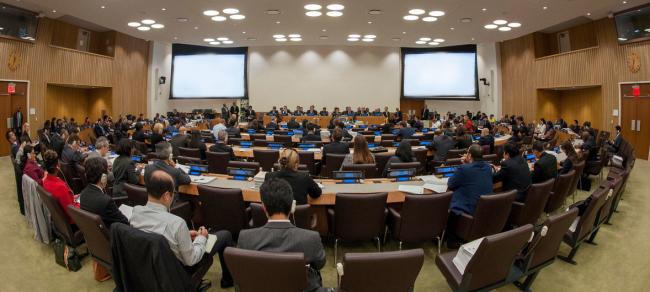
Here’s what happens at the UN General Assembly when world leaders have gone home
New York, Oct 23 (IBNS): After the world media spotlight fades on the General Assembly’s annual high-level debate, the work of the Assembly, the UN’s primary deliberative body, shifts to its so-called Main Committees, where the bulk of the Organization’s work get done.
While the six-day “general debate” grabs headlines for its political and policy speeches from Queens, Kings, Presidents and Prime Ministers, the Assembly’s committees seldom make the news.
Their prosaic names – the First through the Sixth Committee – tell you nothing about what actually goes on when they meet.
But, by taking on matters from disarmament to decolonization; from economic growth to humanitarian aid, these committees work away each week, far from the limelight, translating the policies unveiled by political leaders and senior UN officials into action to be implemented in the real world.
In this feature series over the next few weeks, UN News will be giving you an informative glimpse inside the day-to-day the world of the General Assembly’s main committees.
What do these committees do?
Because of the sheer volume of work to get through, the bulk of the General Assembly’s efforts get channelled into the Main Committees.
Here, the issues are discussed, a common response formulated – by vote, if necessary – and recommendations are then sent back to the Assembly Plenary of all 193 Member States, for its consideration.
Some agenda items such as the question of Palestine are only discussed in the General Assembly Plenary.
There are six Main Committees of the General Assembly:
First Committee – Agenda items related to disarmament and international security
Second Committee – Economic and financial matters
Third Committee – Social, humanitarian, human rights and cultural agenda items
Fourth Committee Also known as the “Special Political and Decolonization Committee”, deals with political subjects not covered under the First Committee
Fifth Committee – UN administration and…the budget
Sixth Committee – Matters relating to international law
Each Committee is a Committee of the Whole, consisting of all 193 Members of the General Assembly. Each member of the Committee has one vote.
According to the Assembly’s Rules of Procedure, decisions of committees are made by a majority of the members present and voting. Committee members may also come to decisions by consensus.Alongside the Main Committees, the General Assembly also includes the nine-member Credentials Committee, which handles the official credentialing of Member States’ representatives; the General Committee, which oversees the Assembly’s progress overall; and a number of other subsidiary bodies. These subsidiary entities may not be made up of all UN Member States.
Who does what – committee officials
The bureau of each Main Committee consists of a Chair, three Vice-Chairs, and a Rapporteur – who produces the official Committee report. They may be elected on the day of the election of the President of the General Assembly, or at the first formal meeting of the Committee.
According to the Assembly’s Rules of Procedure, no Member State can serve both as Vice-President and Chair of a Main Committee during the same session. Furthermore, the Chair of a Main Committee cannot cast a vote, but another member of their delegation may vote in their place.
The Main Committee Chairs are also members of the General Committee, which is chaired by the President of the General Assembly.
Many kinds of meetings (a UN speciality)
The Committees, as with its parent General Assembly, hold formal or informal meetings.
The formal meetings can consider only those items on a particular Committee’s agenda. Furthermore, decisions – in the form of a draft resolution or decision – for the Plenary’s consideration, can only be taken at a formal meeting.
An informal meeting can be held for a variety of reasons. Such meetings may include briefings by Secretariat officials or technical experts, interactions with civil society, consultations or negotiations. No Committee decisions can be taken in informal meetings. Informal meetings also generally do not have translation services, which are, obviously, a vital part of reaching agreement.
In addition to formal and informal, meetings can be open or closed.
Open meetings, as the name suggests, are open to all Member States and Observers, UN entities, civil society, media and the general public (security needs and seating availability, may limit the space open to curious bystanders). These meetings may be broadcast, covered by the media, and meeting records published.
On the other hand, different levels of restrictions apply to closed meetings. Generally, only Member States, Observers or invited participants may attend these meetings. On any given day, the Journal of the UN indicates which meetings are open and which are closed. However, a decision to close an open meeting can be taken during the meeting.
Support Our Journalism
We cannot do without you.. your contribution supports unbiased journalism
IBNS is not driven by any ism- not wokeism, not racism, not skewed secularism, not hyper right-wing or left liberal ideals, nor by any hardline religious beliefs or hyper nationalism. We want to serve you good old objective news, as they are. We do not judge or preach. We let people decide for themselves. We only try to present factual and well-sourced news.







